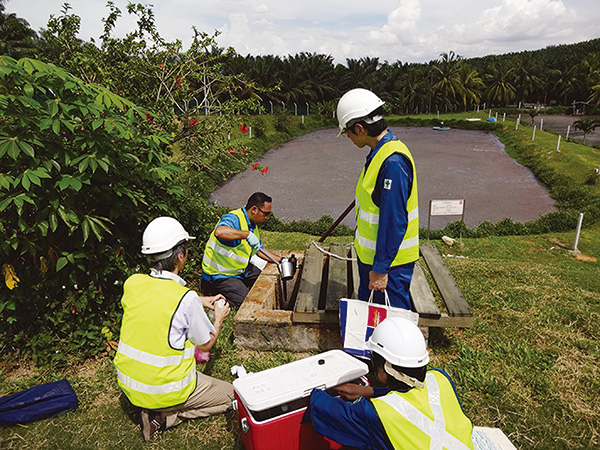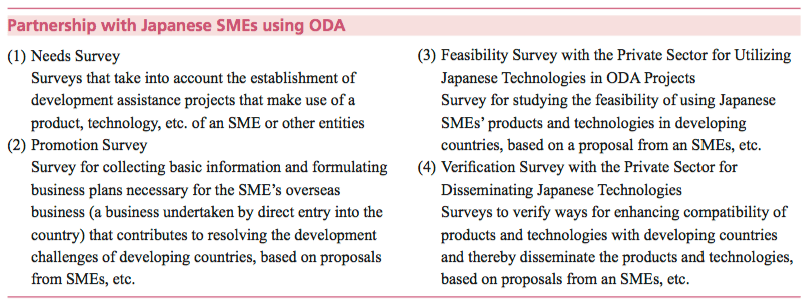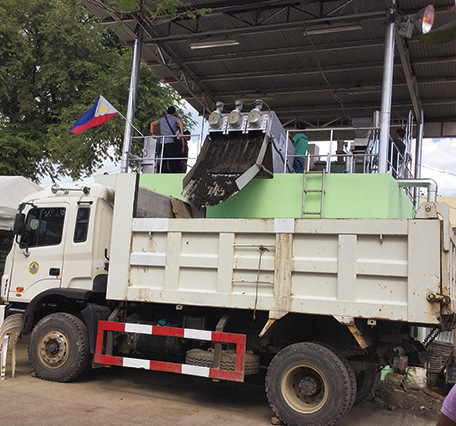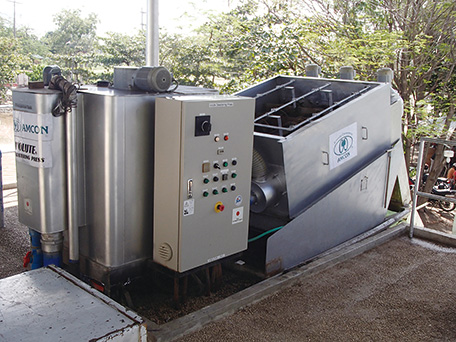Chapter 3 Partnership with the Private Sector

A Hanshin Engineering team collects water samples from an existing water treatment lagoon pond to survey water quality at a palm oil factory in Malaysia.
Official finance including ODA will continue to play a central role in advancing growth and poverty reduction in developing countries. On the other hand, private finance far exceeds official finance into developing countries and the activities of the private sector are increasingly serving as a powerful engine for economic growth of developing countries, and these present circumstances need to be addressed. Based on this recognition, the Development Cooperation Charter outlines Japan’s policy to promote development cooperation through public-private partnerships and partnerships with local governments in order to stimulate private-led economic development of developing countries more vigorously and to enable such development to lead to the robust growth of the Japanese economy.
Collaboration with the private sector is also an essential aspect of the Partnership for Quality Infrastructure, which was announced by Prime Minister Shinzo Abe in May 2015 and of which the follow-up measures were announced in November 2015 (for more information, see ODA Topics “Quality Infrastructure Investment”). There is a limit to what public finance alone can achieve in meeting Asia’s immense infrastructure demand. Accordingly, it is vital to develop mechanisms that attract both public and private finance to infrastructure investment in Asia. For this reason, it is important to establish a mechanism under the Partnership for Quality Infrastructure to use public finance, including ODA as a “catalyst” to mobilize private finance, in collaboration with the Asian Development Bank (ADB).
In other areas than infrastructure, it is also expected that the technologies and know-how of Japanese companies will help provide solutions to the challenges developing countries are facing. In particular, there has been a growing focus on the potential of the excellent products, technologies, and know-how of Japanese small and medium-sized enterprises (SMEs). In a variety of development areas, the Government of Japan has stepped up its efforts to partner with Japanese SMEs that take interest in the development challenges of developing countries and that aspire to expand their overseas businesses. More specifically, the government collaborates with Japanese SMEs in a range of surveys for the SMEs to engage in development cooperation in developing countries; for example, Needs Survey in developing countries; survey to collect local information and formulate business plans; and surveys to examine the potential use of specific products and technologies of Japanese SMEs. Furthermore, the government also collaborates with Japanese SMEs in surveys to verify ways to enhance compatibility of products and technologies with developing countries (see below). These initiatives are continuously producing examples of the masterful techniques of Japanese SMEs contributing to improving the lives of the people in developing countries.


All septic tank sludge generated in the city is treated using dewatering equipment developed by AMCON INC., and after that transported by trucks. The water is treated appropriately and then released in rivers, and the solid parts can be composted. (Photo: AMCON INC.)
An example of a Verification Survey with the Private Sector for Disseminating Japanese Technologies is the initiative to address the issue of household wastewater on Cebu Island, the Philippines. In the city of Cebu in the central part of Cebu Island, the pollution of public waters and groundwater was becoming a serious problem due to the discharge of sewage without appropriate dewatering of sludge from households.
Attention was then directed to the dewatering machine for septage management developed by AMCON INC., a dewatering machinery maker in Yokohama City. This machine is not only easy to install and inexpensive, it is also capable of separating sludge including human feces into solids and liquids, enabling efficient dewatering treatment of septage.
In 2013, the Government of Japan partnered with AMCON INC. to conduct a survey to verify the practicality of this technology and to promote its use in Cebu. The survey found that the technology was very effective for addressing the issue of sludge treatment in this city, leading to several private companies and neighboring local governments expressing strong interest in the technology. As a result of this survey, it is highly expected that this Japanese SME’s technology will resolve the serious sanitation problem in the Philippines.
For more examples of active contributions of Japanese SMEs to development cooperation, see the “Master Techniques - From Japan to the World” columns in this White Paper.

Dewatering equipment with sludge treatment capacity of 10t per hour. The equipment, which features power and water saving and ease of operational control enables unattended operation around the clock. (Photo: AMCON INC.)
